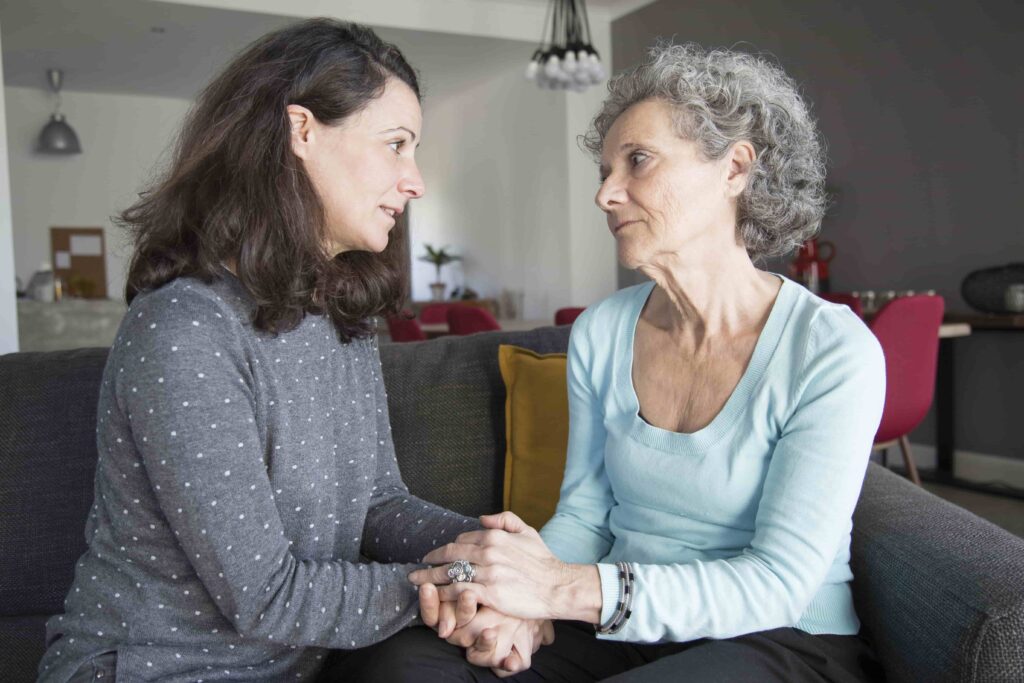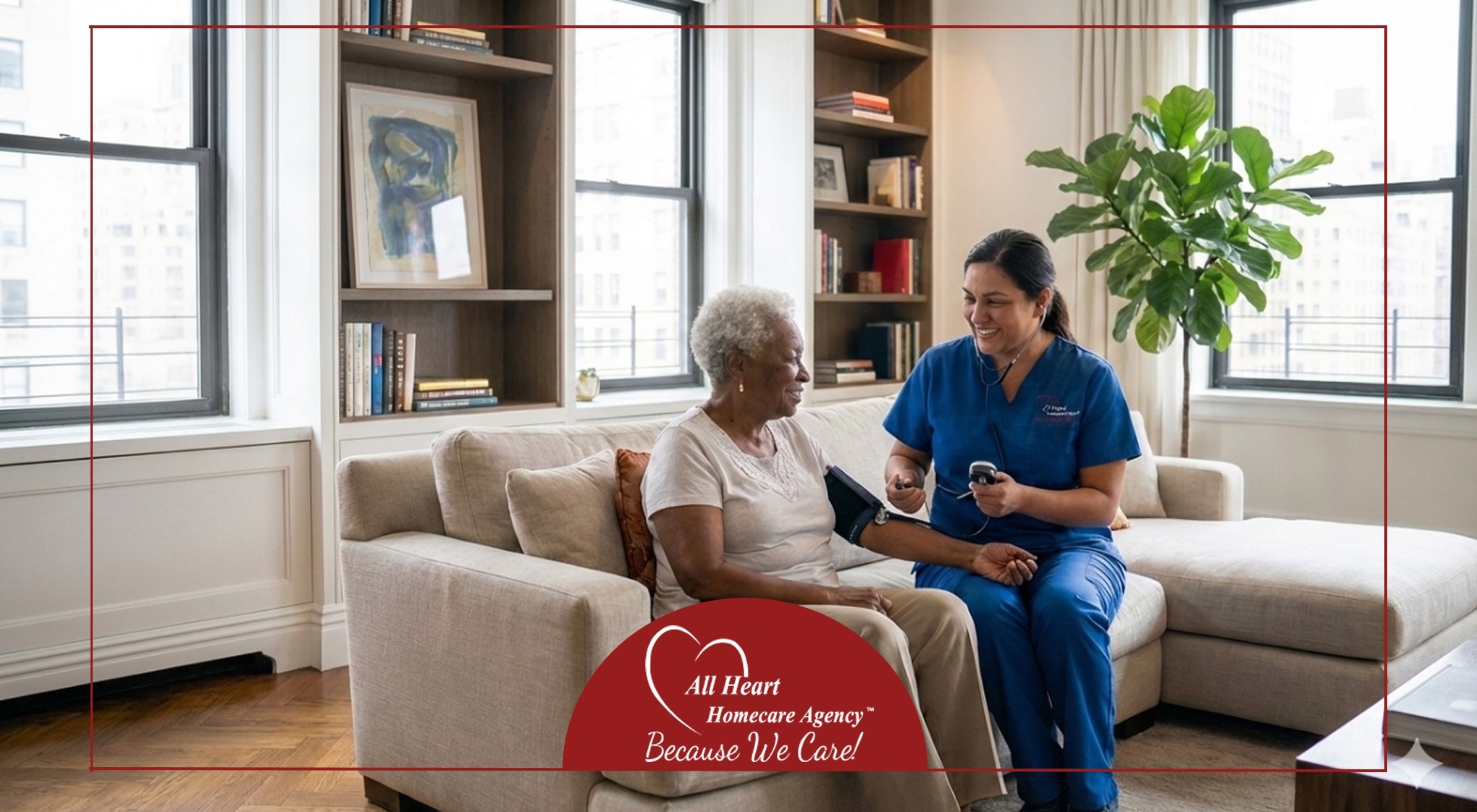What are the early signs of caregiver burnout and how can you prevent it?
Caregiver burnout usually doesn’t hit all at once. It builds up slowly. You might notice that you’re constantly tired, even after sleeping, or that little things start to feel overwhelming. Some caregivers feel more irritable than usual, have trouble focusing, or stop enjoying things they used to look forward to. Others push through physical pain, headaches, or anxiety without realizing how worn down they’ve become.
Paying attention to these early signs matters. Taking breaks, asking for help before you feel desperate, and giving yourself permission to rest aren’t luxuries — they’re part of staying well enough to keep caring for someone else. The sooner burnout is recognized, the easier it is to slow it down and protect your mental and emotional health.
“The person who was my rock is now depending on me, and I feel like I’m drowning.”
These words, spoken by Maria, a 52-year-old daughter caring for her father with Alzheimer’s, echo the silent struggle of over 53 million Americans who provide unpaid care to family members. While caregiving is an act of profound love, it can exact a devastating toll on mental health when we forget that caring for ourselves isn’t selfish—it’s essential.
At All Heart Homecare, we’ve witnessed countless families navigate this challenging journey. Over our 13 years of service, we’ve learned that caregiver mental health isn’t just about individual wellbeing—it’s the foundation that makes compassionate, effective care possible for your loved one.
Understanding Caregiver Burnout: More Than Just Feeling Tired
What Makes Caregiver Burnout Different
Caregiver burnout isn’t simply being tired after a long day. It’s a state of physical, emotional, and mental exhaustion that develops when the demands of caregiving exceed your ability to cope. Unlike workplace stress, caregiver stress often lacks a clear end date and carries the weight of deep emotional bonds.
In the words of Dr. Patricia Rodriguez: “Caregiver burnout manifests differently than regular stress. It’s characterized by feeling overwhelmed, emotionally drained, and losing the sense of satisfaction that once came from helping your loved one.”
Recognizing the Warning Signs Early
Many caregivers miss the early warning signs because they’re focused entirely on their loved one’s needs. Watch for these indicators:
Physical symptoms:
- Chronic fatigue that sleep doesn’t relieve
- Frequent headaches or back pain
- Changes in appetite or sleep patterns
- Getting sick more often
Emotional symptoms:
- Feeling helpless or hopeless about your situation
- Irritability with your loved one or others
- Loss of interest in activities you once enjoyed
- Anxiety about the future
Behavioral changes:
- Isolating yourself from friends and family
- Neglecting your own health needs
- Using alcohol or substances to cope
- Having thoughts of harming yourself or your loved one
Why Caregivers Are Particularly Vulnerable
The nature of caregiving creates a perfect storm for mental health challenges. Unlike other stressful situations, caregiving often involves:
- Chronic stress exposure: Caring for someone with dementia or TBI means constant vigilance
- Social isolation: Many caregivers report feeling cut off from their support networks
- Financial strain: Medical expenses and lost income compound stress levels
- Anticipatory grief: Watching a loved one decline creates ongoing loss
Building Your Resilience Foundation
Self-Awareness as Your First Defense
Building resilience starts with honest self-assessment. We encourage the families we serve to implement daily check-ins. Ask yourself:
- How is my energy level today?
- What emotions am I experiencing?
- What triggered my stress yesterday?
- What helped me feel better?
Rosa, who cared for her husband through stroke recovery, shared: “I started keeping a simple mood journal. Just three sentences each morning helped me spot patterns—like how I always felt worse on days when I skipped breakfast or didn’t get outside.”
The Power of Support Networks
Building your care team doesn’t mean you’re failing—it means you’re being strategic. Your support network might include:
- Family members who can provide respite care
- Friends who offer practical help, like grocery shopping
- Professional caregivers who understand your challenges
- Support groups (both in-person and online)
- Healthcare professionals who treat your loved one
Connecting with caregiver support groups has proven invaluable for many families we’ve served. These groups offer:
- Validation that your feelings are normal
- Practical tips from people in similar situations
- Emotional support during difficult times
- Information about local resources
Setting Healthy Boundaries
Learning to set boundaries feels impossible when you love someone deeply. However, boundaries protect both you and your loved one by ensuring you can provide sustainable care.
Saying “no” without guilt is a skill that requires practice. Start small:
- “I can’t visit today, but I can call tonight.”
- “I need to rest this afternoon before the evening routine.”
- “I can help with the appointment, but I need someone else to handle dinner.”
Remember, saying no to one thing means saying yes to something else—often your own wellbeing.
Practical Burnout Prevention Strategies
Daily Self-Care That Actually Works
Forget about hour-long bubble baths or expensive spa days. Effective self-care for caregivers happens in small, consistent moments:
5-minute techniques that make a difference:
- Deep breathing exercises during medication time
- Listening to one’s favorite song while preparing meals
- Stepping outside for fresh air
- Stretching your neck and shoulders
- Writing down three things you’re grateful for
Mindfulness for caregivers doesn’t require meditation apps or special training. Try:
- Focusing fully on one task at a time
- Noticing five things you can see, four you can hear, three you can touch
- Taking three conscious breaths before entering your loved one’s room
- Paying attention to positive moments during care routines
Stress Management in Real-Time
When stress hits during caregiving moments, you need immediate tools:
The “oxygen mask principle” reminds us that we must care for ourselves first to care for others effectively. This isn’t selfish—it’s practical.
Quick stress relief techniques:
- Count backwards from 10 while taking slow breaths
- Tense and release your shoulder muscles
- Step into another room for 30 seconds
- Call or text a supportive friend
Cognitive reframing helps shift your perspective during challenging moments:
- Instead of “This is impossible,” try “This is hard, but I’m handling it.”
- Replace “I can’t do this anymore” with “I’m doing the best I can right now.”
- Change “They’re being difficult” to “They’re struggling, and so am I.”
Smart Time and Energy Management

Prioritizing tasks using the urgent versus important framework helps focus your limited energy:
- Urgent and important: Medical emergencies, safety issues
- Important but not urgent: Exercise, social connections, preventive care
- Urgent but not important: Some phone calls, non-critical requests
- Neither urgent nor important: Perfect housekeeping, unnecessary errands
Creating realistic schedules means building in buffer time and flexibility. Plan for 70% of your day and leave 30% for unexpected needs.
When to Seek Professional Help
Recognizing When Self-Help Isn’t Enough
Some signs indicate you need professional support:
- Thoughts of harming yourself or your loved one
- Using alcohol or substances to cope regularly
- Persistent feelings of hopelessness lasting more than two weeks
- Inability to find joy in any activities
- Significant changes in sleep or appetite
Types of Professional Support Available
Individual therapy can provide:
- Safe space to process difficult emotions
- Strategies specific to your situation
- Help working through grief and loss
- Tools for managing anxiety and depression
Caregiver support groups offer a connection with others who understand your experience. Many are available in multiple languages to serve diverse communities.
Respite care services, such as All Heart Homecare, provide temporary relief, allowing you to:
- Attend medical appointments
- Spend time with other family members
- Simply rest and recharge
- Maintain other important relationships
Overcoming Barriers to Getting Help
Addressing stigma: Many cultures view seeking mental health support as a weakness. Remember, getting help shows strength and wisdom—you’re taking action to provide better care.
Time constraints: Consider online therapy options, virtual support groups, or counselors who offer evening or weekend appointments.
Financial concerns: Many insurance plans cover mental health services. Community health centers often provide sliding-scale fees, and some nonprofits offer free support groups.
Building Long-Term Resilience

Creating Your Personal Resilience Plan
Your resilience plan should include:
Emergency self-care kit:
- Contact numbers for respite care services
- List of supportive friends and family
- Quick stress-relief techniques that work for you
- Favorite calming music or videos
- Healthy snacks and comfort items
Regular plan reviews help you adjust strategies as needs change. What worked during early-stage dementia may not work as the condition progresses.
Finding Meaning in Your Caregiving Journey
Reframing challenges doesn’t mean pretending difficulties don’t exist. Instead, it means finding purpose and growth within them:
- “This experience is teaching me about my own strength.”
- “I’m creating meaningful moments with my loved one.”
- “I’m honoring our relationship by providing this care.”
- “I’m learning valuable life skills.”
Celebrating small victories matters enormously:
- A peaceful afternoon together
- Successfully managing a medical crisis
- Your loved one recognizes you
- Getting through a difficult day with patience
Essential Resources for Ongoing Support
Technology Tools That Help
Modern technology offers valuable support:
- Medication reminder apps for complex schedules
- Caregiver-specific social networks for peer support
- Telehealth platforms for mental health services
- Emergency alert systems for safety
Cultural and Language Resources
We understand that effective support must be culturally relevant:
- Russian-speaking families can access resources through organizations like the Russian-American Community Association
- Hispanic families benefit from Spanish-language support groups and culturally sensitive counselors
- All families deserve care that honors their cultural values and communication styles
Financial and Legal Planning
Understanding available support helps reduce financial stress:
- Veterans’ benefits for military families
- Medicare and Medicaid coverage for respite care
- State programs for family caregivers
- Legal aid for advance directives and care planning

Moving Forward with Hope and Strength
Caring for a loved one with dementia, TBI, or other serious conditions is one of life’s greatest challenges. It’s also one of life’s most profound expressions of love. Your wellbeing isn’t a luxury—it’s the foundation that makes this expression of love sustainable.
Start with one small step today. Perhaps it’s joining an online support group, taking five minutes for deep breathing, or calling a friend you haven’t spoken to in months. Every action you take to care for yourself is an investment in your ability to care for your loved one.
Remember, you’re not just surviving this journey—you’re building resilience that will serve you and your family for years to come. At All Heart Homecare, we’ve seen thousands of families not just endure these challenges but emerge stronger, more connected, and deeply aware of their own remarkable strength.
The heart that gives so freely to others deserves care too. You deserve support, rest, and hope. Most importantly, you deserve to know that you’re not alone in this journey. We’re here, your community is here, and together, we can ensure that love—both for others and for yourself—remains at the center of your caregiving experience.
Your dedication to your loved one is extraordinary. Now it’s time to extend that same compassion to yourself.Contact All Heart Homecare Agency today and find out how we can help.











